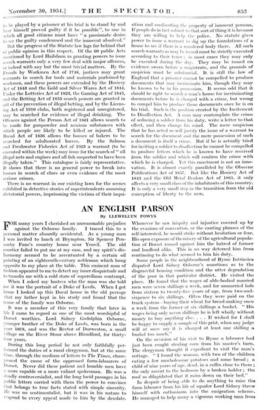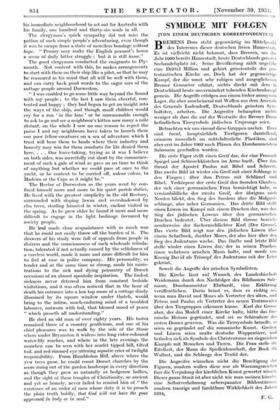AN ENGLISH PARSON
By LLEWELLYN POWYS
FOR many years I cherished an unreasonable prejudice against the Osborne family. I traced this to a personal matter absurdly accidental. As a young man I was invited to lunch at Brympton, Sir Spencer Pon- sonby Fane's country house near Yeovil. The old courtier failed to put me at my ease, and my spirit's dis- harmony seemed to be accentuated by a certain oil painting of an eighteenth-century nobleman which hung opposite to my place at the table. This eminent man of fashion appeared to me to detect my inner disquietude and to transfix me with a cold stare of supercilious contempt.
When I asked my hostess who the man was she told me it was the portrait of a Duke of Leeds. When I got home I looked up this Ducal house in the old peerage that my father kept in his study and found that the name of the family was Osborne.
It was a member of this very family that later in life I came to regard as one of the most worshipful of Dorset worthies. Lord Sidney Godolphin Osborne, younger brother of the Duke of Leeds, was born in the year 1808, and was the Rector of Durweston, a small village on the River Stour above Blandford, for thirty- lour years.
During this long period he not only faithfully per- formed the duties of a rural clergyman, but at the same time, through the medium of letters to The Times, cham- pioned the cause of the oppressed farm-labourers of Dorset. Never did these patient and humble men have a more capable or a more valiant spokesman. He was a deadly controversialist, and the long lucid passages in his public letters carried with them the power to convince that belongs to true facts stated with simple sincerity. lie was no sentimentalist, but it was in his nature to respond to every appeal made to him by the desolate. Whenever he saw iniquity and injustice covered up by the evasions of convention, or the canting phrases of the self-interested, he would strike without hesitation or fear. His open exposure of the misery of the agricultural popula- tion of Dorset roused against him the hatred of farmer and landlord alike. This in no way deterred him from continuing to do what seemed to him his duty.
Some people in the neighbourhood of Ryme Intrinsica disputed Lord Sidney Osborne's assertions as to the disgraceful housing condition and the utter degradation of the poor in that particular district. He visited the place. He found that the wages of able-bodied married men were seven shillings a week, and for unmarried lads from sixteen to twenty-five years of age, from two-and- sixpence to six shillings. Often they were paid on the truck system—buying their wheat for bread-making once a week from the farmer at six shillings a bushel. " His wages being only seven shillings he is left wholly without money to buy anything else If wished for I shall be happy to supply- a sample of this grist, when any judge will at once say it is charged at least one shilling a bushel too much."
On the occasion of his visit to Ryme a labourer had just been caught stealing corn from his master's barn. The clergyman thought it expedient to visit the man's cottage. " I found the woman, with two of the children eating a few unwholesome potatoes and some bread ; a child of nine years of age, dead, in a coffin close to them ; the only ascent to the bedroom by a broken ladder ; the roof so dilapidated that it rains down on their bed." In despair of being able to do anything to raise the farm labourer from his life of squalor Lord Sidney threw himself with enthusiasm into the emigration scheme. He managed to help many a vigorous working man from his immediate neighbourhood to set out for Australia with his family, one hundred and thirty-six souls in all.
The clergyman's quick sympathy did not miss the pathos of such simple people's adventuring, even though it was to escape from a state of merciless bondage without hope. " Penury may make the English peasant's home a scene of daily bitter struggle ; but it is still home."
The good clergyman conducted the emigrants to Ply- mouth. Not content with this, he makes arrangements to start with them on their ship like a pilot, so that he may be reassured in his mind that all will be well with them, and can carry back good words to the eager ears of the cottage people around Durweston.
" I was enabled to go some little way beyond the Sound with my people ; to the last I saw them cheerful, con- tented and happy ; they had begun to get an insight into the ways of the ship, and though small children would cry for a run ' in the lane ' or be unreasonable enough to ask to go and see a neighbour's kitten now many a mile distant, on the whole I saw no one reason to regret the pains I and my neighbours have taken to launch these our poor fellow-creatures on a sea of adventure which I trust will bear them to lands where their industry and honesty may win for them comforts for life denied them here. . . . Our leave-taking, trying as it was I believe on both sides, was mercifully cut short by the commence- ment of such a gale of wind as gave us no time to think of anything but whether we could pass at once to the yacht, or be content to be carried off, nolens volens, to Madeira or the Cape as it might be."
The Rector of Durweston as the years went by con- fined himself more and more to his quiet parish duties. He lived with the greatest simplicity in the old Rectory, surrounded with sloping lawns and overshadowed by elm trees, starling haunted in winter, cuckoo visited in the spring. As he grew older he found it more and more difficult to engage in the light badinage favoured by society people.
He bad made close acquaintance with so much woe that he could not easily throw off the burden of it. The drawers of his study were full of appeals from people in distress and the consciousness of such wholesale tribula- tion, tolerated if not actually caused by the selfishness of a careless world, made it more and more difficult for him to feel at ease in polite company. His personality, so tender and at the same time so strong, made his minis- trations to the sick and dying peasantry of Dorset occasions of an almost apostolic inspiration. The foulest sickness never deterred him from constant bedside visitations, and it was often noticed that in the hour of death his entrance into a low top room of a cottage dimly illumined by its square window under thatch, would bring to the infirm, much-enduring mind of a troubled labourer, outworn with toil, that blessed mood of peace which passeth all understanding."
He died an old man of over eighty years. His tastes remained those of a country gentleman, and one of his chief pleasures was to walk by the side of the Stour where under Bryanston it widens into long cider-coloured water-lily reaches, and where in the late evenings the moorhen can be seen with her scarlet tipped bill, tilted tail, and red-rimmed eye uttering aquatic cries of twilight responsibility. From Hambledon Hill, above where the yew trees grow, he could count Dorset churches by the score rising out of the garden landscape in every direction as though they grew as naturally as hedgerow hollies, and the sight of these temples of Christianity, so ancient and yet so homely, never failed to remind him of " the existence of an order of men whose duty it is to preach the plain truth boldly, that God will not have the poor oppressed in body or in soul."











































 Previous page
Previous page